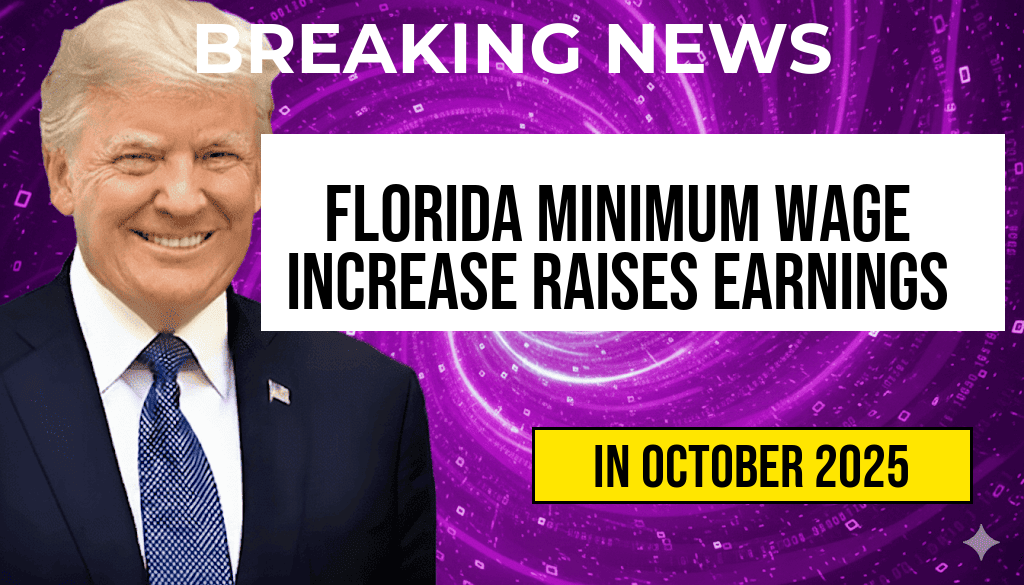Florida’s recent decision to raise the minimum wage to $14 per hour is poised to significantly impact the earnings of full-time workers across the state. Effective starting September 2023, this increment marks a substantial increase from the previous $11 per hour, representing a nearly 27% boost. For full-time employees working 40 hours a week, this change could translate into an additional $2,080 annually in earnings. The move aligns with Florida’s broader efforts to address wage disparities and support living standards amid rising inflation. Employers and workers alike are assessing how this adjustment will influence employment costs, consumer spending, and economic growth within the state. As the policy unfolds, experts anticipate a ripple effect across various sectors, potentially reshaping wage structures and labor market dynamics in Florida.
Details of the Minimum Wage Increase
Implementation Timeline and Scope
Florida’s minimum wage law mandates annual increases indexed to inflation, with the latest adjustment raising the rate to $14 per hour. The increase was approved by state lawmakers and supported by labor advocates aiming to improve earnings for low-wage workers. The adjustment applies to all employers within the state, covering industries from retail to hospitality, where minimum wage rules are most prevalent.
Comparison with Previous Rates
| Year | Minimum Wage | Annual Increase (approx.) |
|---|---|---|
| 2020 | $8.56 | N/A |
| 2021 | $8.65 | $.09 |
| 2022 | $10.00 | $1.35 |
| 2023 | $11.00 | $1.00 |
| 2024 (Projected) | $14.00 | Increase of $3.00 |
Economic Impact on Workers and Employers
Potential Earnings Boost
For a full-time worker earning the minimum wage, the increase to $14 per hour results in an additional $2,080 annually. This calculation assumes a standard 40-hour workweek over 52 weeks. The new wage significantly narrows the gap between minimum wage earnings and living costs in many parts of Florida, especially in urban centers like Miami, Orlando, and Tampa.
Impact on Employment and Business Operations
Industry analysts predict mixed effects on employment levels. Some small businesses express concern over increased labor costs, which could lead to higher prices for consumers or adjustments in staffing. Conversely, higher wages might boost worker productivity and reduce turnover, ultimately benefiting employers over time. Larger corporations may absorb the increase more easily, but the policy underscores a statewide push to elevate minimum wages as a part of economic recovery strategies.
Broader Context and Policy Considerations
Florida’s Wage Policy in Perspective
Florida’s move to raise the minimum wage aligns with a broader national trend where states are setting higher wage floors than the federal minimum of $7.25. Several states, including California and New York, have implemented phased increases to reach or surpass $15 per hour. Florida’s targeted increase to $14 in 2024 reflects a compromise aimed at balancing economic growth with wage improvements.
Cost of Living and Wage Adequacy
While a $14 per hour wage represents a notable raise, experts note that the cost of living in Florida varies significantly. Urban areas with higher housing costs might still see wage inadequacy for many workers, prompting ongoing discussions about comprehensive strategies to address affordable housing, healthcare, and transportation alongside minimum wage policies.
Community and Political Reactions
Labor advocates have lauded the increase as a step toward economic justice, emphasizing the importance of fair wages in reducing poverty and boosting consumer spending. Critics, however, warn of potential unintended consequences, such as reduced hiring or increased automation. Policymakers continue to monitor the economic effects, with some calling for further adjustments and support measures for small businesses.
Sources and Additional Reading
- Wikipedia: Minimum wage in the United States
- Forbes: How Minimum Wage Increases Are Shaping Business in Florida
Frequently Asked Questions
What is the new minimum wage in Florida?
The minimum wage in Florida has increased to $14 per hour.
How much could full-time workers’ annual earnings increase with this wage hike?
Full-time workers could see an annual earnings increase of approximately $2,080 due to the minimum wage increase.
When did the Florida minimum wage increase take effect?
The wage increase is effective starting from the current year, aligning with Florida’s scheduled adjustments for minimum wage changes.
Who benefits the most from the minimum wage increase in Florida?
Full-time workers earning close to the minimum wage are expected to benefit the most, as their earnings will see a significant boost.
Will this wage increase impact employers in Florida?
Yes, employers may face higher labor costs, but the wage hike aims to improve worker earnings and economic stability.






